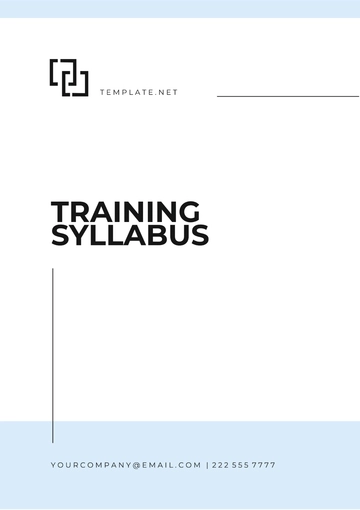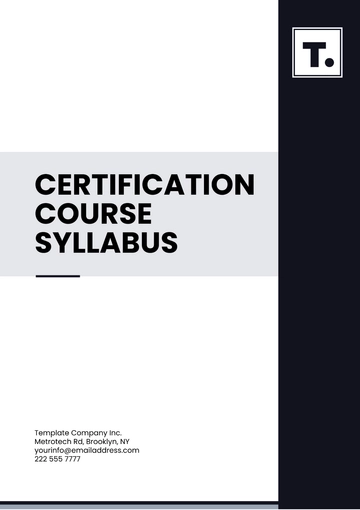Free International Finance Syllabus

International Finance Course
Course Title | [COURSE TITLE] |
Course Code | [COURSE CODE] |
Class Location | [CLASS LOCATION] |
Class Time | [CLASS TIME] |
Class Duration | [DATE] - [DATE] |
1. Course Description
The International Finance course is designed to provide students with a comprehensive understanding of financial concepts and principles in the context of the global economy. Through exploration of topics such as foreign exchange markets, international investment, and multinational corporate finance, students will develop analytical skills crucial for navigating the complexities of international finance. By the conclusion of the course, students will be proficient in analyzing economic trends, assessing the impact of exchange rate fluctuations, and formulating strategic investment decisions within the global marketplace.
2. Instructor Information
Instructor: [YOUR NAME]
Email: [YOUR EMAIL]
Office Hours: [OFFICE HOURS]
3. Learning Objectives
Understand the fundamental theories and concepts of international finance.
Analyze the implications of exchange rate fluctuations on international trade and investment.
Evaluate the role of multinational corporations in the global financial landscape.
Apply financial models and tools to assess investment opportunities in diverse international markets.
Develop strategies for managing financial risk in cross-border transactions.
Critically assess the impact of international financial regulations and policies on global economic stability.
4. Course Schedule
Week | Topic | Activities |
|---|---|---|
1 | Introduction to International Finance | Lectures, Discussion |
2 | Foreign Exchange Markets | Case Studies, Guest Speaker |
3 | International Investment | Group Projects, Debates |
4 | Multinational Corporate Finance | Simulation Exercises, Guest Lecture |
5 | Financial Risk Management | Problem-solving Sessions, Research Assignments |
6 | International Financial Regulations and Policies | Presentations, Policy Analysis |
5. Required Reading and Materials
Madura, J. (2020). International Financial Management. Cengage Learning.
Eun, C., & Resnick, B. (2018). International Financial Management. McGraw-Hill Education.
Journal Articles and Research Papers (Provided throughout the course).
Financial Databases and Software (Access provided by the instructor).
6. Assignments and Assessments
Grading Component | Weight (%) |
|---|---|
Weekly Quizzes based on Reading Assignments | 20 |
Midterm Examination covering Course Material | 30 |
Group Project: Analysis of a Multinational Corporation | 20 |
Research Paper on a Current International Finance Issue | 20 |
Class Participation and Engagement | 10 |
7. Course Policies
Attendance: Regular attendance is expected. Notify the instructor in advance in case of absence.
Punctuality: Be on time for lectures, discussions, and examinations.
Academic Integrity: Plagiarism and cheating will not be tolerated.
Respect: Respectful behavior towards classmates and the instructor is required.
Communication: Use professional language in all communications with the instructor and classmates.
8. Grading Policy
Grading Component | Weight (%) |
|---|---|
Weekly Quizzes | 15 |
Case Studies | 20 |
Research Paper | 25 |
Group Project | 20 |
Final Examination | 20 |
9. Additional Resources
Online Financial Databases and Journals: Access to reputable online financial databases and journals will be provided to supplement course materials and facilitate research on international finance topics.
University's Academic Support Services: Students will have access to a range of academic support services provided by the university, including tutoring, writing centers, and academic advising, to enhance their learning experience.
Study Groups and Tutoring Sessions: Opportunities for students to form study groups and participate in tutoring sessions will be available to foster collaborative learning and provide additional support outside of class.
Guest Speakers and Industry Seminars: Guest speakers from the finance industry will be invited to share their insights and expertise on relevant topics, providing students with valuable real-world perspectives.
10. Communication Guidelines
Communication with the instructor should be conducted via email or during office hours. All communication should be clear, professional, and respectful.
Students are encouraged to actively participate in class discussions and engage with peers in a respectful and constructive manner.
Any concerns or questions regarding the course should be addressed promptly to ensure a smooth learning experience for all students.
11. Course Evaluation
Your feedback is valuable in improving the course. Please complete the course evaluation at the end of the semester to provide insights into the effectiveness of the course structure, content, and teaching methods. Your input will help inform future iterations of the course and enhance the learning experience for future students.
Disclaimer
The course syllabus is subject to change at the discretion of the instructor. Any modifications will be communicated to students in a timely manner via email or during class sessions. Students are responsible for staying updated on any changes to the syllabus and adhering to the revised course requirements.
- 100% Customizable, free editor
- Access 1 Million+ Templates, photo’s & graphics
- Download or share as a template
- Click and replace photos, graphics, text, backgrounds
- Resize, crop, AI write & more
- Access advanced editor
Explore the epitome of efficiency with the International Finance Syllabus Template from Template.net. Crafted for educators and institutions, this editable and customizable template streamlines course planning. Tailor content effortlessly with our Ai Editor Tool. Elevate your syllabi to new heights of clarity and professionalism. Revolutionize your teaching today.





























